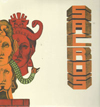 Sacros won the 1968 Chilean schools contest for "beat" groups. Five years later they recorded their only record: this Latin American country rock hymn cycle inspired in part by ancient Mayan and Andean Gods. Released September 18, 1973, seven days after a military coup installed the dictator General Augusto Pinochet, most copies were destroyed in the subsequent crackdown.
Sacros won the 1968 Chilean schools contest for "beat" groups. Five years later they recorded their only record: this Latin American country rock hymn cycle inspired in part by ancient Mayan and Andean Gods. Released September 18, 1973, seven days after a military coup installed the dictator General Augusto Pinochet, most copies were destroyed in the subsequent crackdown.
40 years ago, Sacros looked set for success, at least in their native land. They had won the national schools competition in their "carefully chosen look, dressing in black trousers with white lace shirts" and at the time of recording their debut (after numerous changes of personnel) they were a well-honed trio, having practised at the Divina Providence Church in exchange for "making an electric mass". Tomas Herrera was drumming, and Hernan Valdovinas was on bass sharing vocals with Patricio Panussis, one of the first 12-string guitarists in Chile.
This self-titled disc is a lovely cross-pollination. On one hand Sacros were friends with many priests and exposed to religious music; hence their name, "Sacred," on the other, they were hearing US electric folk influences such as The Byrds. Ironically, other US influences were at work in Chile, too. At the behest of Nixon and Kissinger, the CIA
were busy training the Chilean miltary, and funding anti-government strikes. Kissinger stated that "the issues are much too important for the Chilean voters to be left to decide for themselves" and "I don't see why we need to stand by and watch a country go Communist due to the irresponsibility of its people." On September 11, 1973, the Chilean airforce bombed Santiago using British-made planes, and decades of murder, torture and other human rights abuses were set in motion. On the day of the coup, Salvador Allende took his own life. Poet and singer Victor Jara was held with thousands of others in the Chile Stadium where he was repeatedly beaten before being machine gunned. Before his death, Jara wrote a poem about the conditions in the stadium which was smuggled out in the shoe of a friend. And let me take this opportunity to point you to Robert Wyatt's version of Jara's "Te Recuerdo Amanda" ("I remember Amanda"). An estimated 200,000 people left Chile for exile. Two members of Sacros fled to Spain. Herrera quit music. Valdavinos became a renowned painter and only returned to his homeland post-Pinochet to play music again with his old friend Panussis. The latter had remained in Chile and subsequently formed the band Miel and also Musica Universal (unfortunately, a "new age" act). Henry Kissinger won the 1973 Nobel Peace prize.
So, for very good reason, then, this is an ultra-rare album. I listened to it with bated breath, as the early 1970s combination of spiritual and country rock styles might have come out sounding as dodgy as Spinal Tap meets the Gypsy Kings. Yet, with light production, restrained playing and gentle experimentation, Sacros has an integrity which modern attempts to create the analog sound can't match, and it always steers clear of the worst turgid excesses of the psychedlic rock era. The short opening piece "Aum" welcomes us to Chile in muted fashion, reverential voices to the fore. After that, in innocent contrast to the political events which would unfold, it is consistently breezy. As a non-Spanish speaker, I find the lyrics pleasantly mysterious but for all I know it's trite nonsense. No matter, this is a record I'll be enjoying for a while. Patricio Panussis's guitar playing at the start of "Iluso Que Suenos" has a hypnotic propulsive quality predicting Johnny Marr by about 25 years. A psychedelic ode to the Plumed Serpent "Quetzalcoatl," God of the Mayas, is also a highlight, but the truly transcendental track is "La Realidad" ("The Reality"). This piece is a perfect crescenso of infectious vocal melodies, thumping bass, and jangling guitar; from one West Coast to another. Chile Stadium is now named Estadio Victor Jara and (in musical terms) Sacros is a worthy reissue. Some spirits cannot be "disappeared."
samples:
Read More

